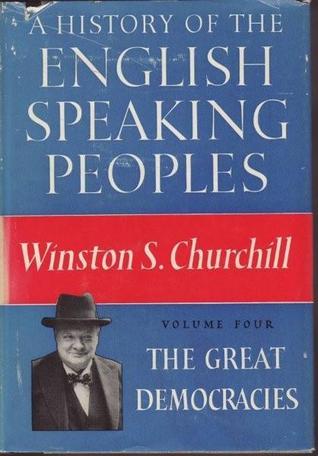The Great Democracies
 For most of the series, “English-speaking peoples” means “English”, but for Churchill’s final volume this really widens the scope, with the United States being an ever more important entity through out the time period of the book.
For most of the series, “English-speaking peoples” means “English”, but for Churchill’s final volume this really widens the scope, with the United States being an ever more important entity through out the time period of the book.
However, the first section is pretty much all domestic English politics from after the defeat of Napoleon to the mid-Nineteenth Century. There’s some diversions for things like fears of Russia, and the end talks about the mass migrations that happened during this time, but mostly we’re looking at prime ministers, and the bigger events, often legislative, of their governments. For an overview book covering almost a century, this isn’t a bad thing, but as a man engaged in British politics his entire adult life, you can easily see here where his interests lie.
The second part is the American Civil War, which is by no means a bad 130-page summary. Churchill isn’t trying to put any particular ‘spin’ on things, but this means it is representative of the books he had read when composing this in the ’30s and finishing it in the ’50s. It’s not Lost Cause by any means, but elements of it are here, including a full “Man of Marble” view of Lee.
The last part is largely a return to British politics, just with more attention on the international stage, with things like the unification of Germany being called out. There is a good chapter on Reconstruction, as well as America’s emergence onto the world stage. The book doesn’t really give itself a hard ending date, but does wrap up with the death of Queen Victoria and the Boer War.
Despite only covering about 87 years, this possibly the weakest book of the set, possibly because of the variety of things Churchill has to cover, and certainly it is trivial to get better coverage of much of the contents. But it does finish up the series nicely, and Winston Churchill could write. If you don’t know much of the period, this isn’t a bad place to start, and better-written than many, otherwise, its value is more in the prose, or to see some of the attitudes of someone who once wrote, “history will be kind to me, for I intend to write it.”

Discussion ¬